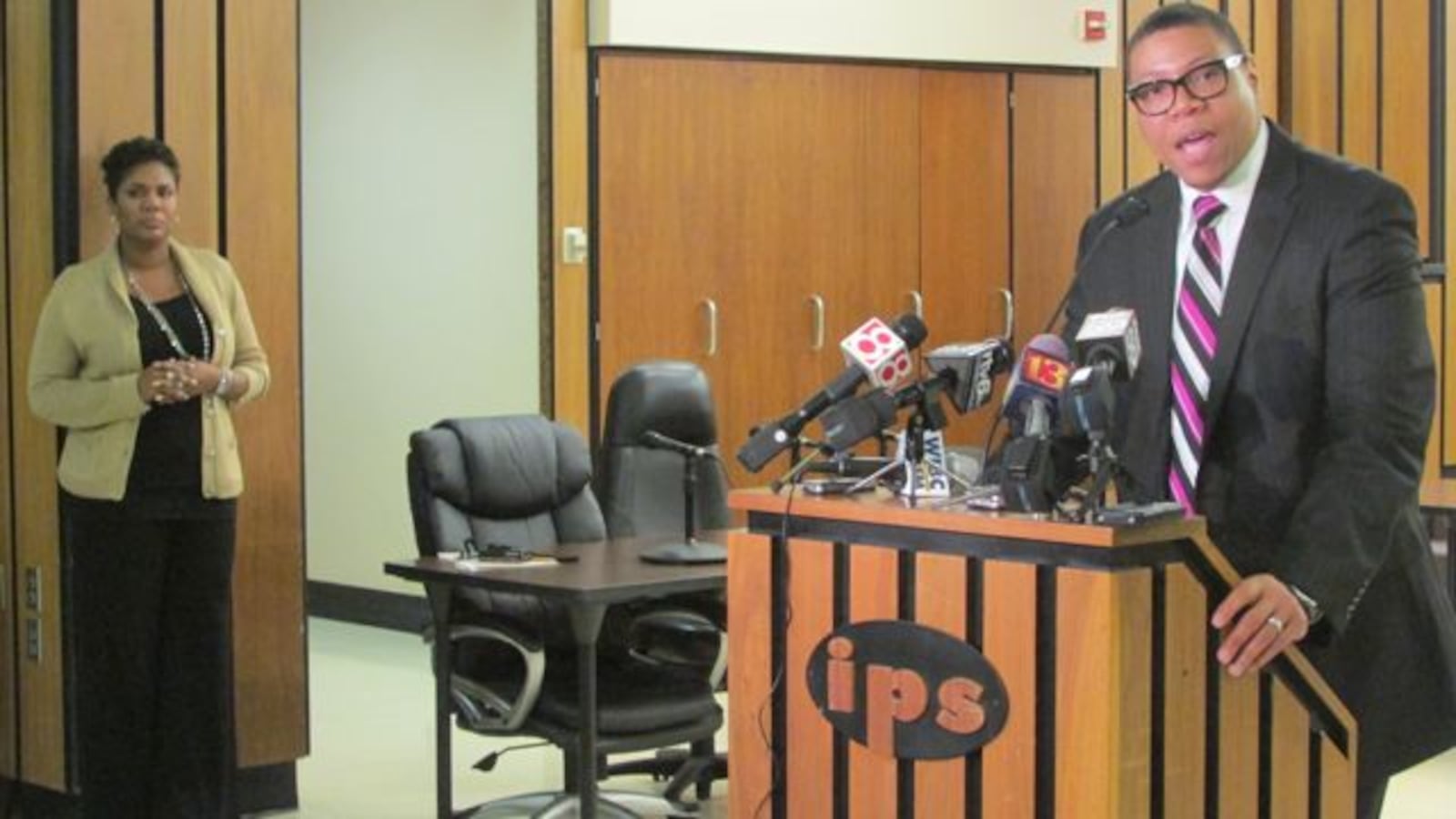Lewis Ferebee, superintendent of Indianapolis Public Schools, bristled today at doubts about his assertion that the district’s financial woes are considerably less severe than widely believed.
His own investigation led Ferebee to announce Tuesday that IPS inflated its budget, probably over several years, making it appear a $30 million budget was looming. In fact, Ferebee said, the district finished 2013 with a modest surplus.
But his immediate predecessor, former interim Superintendent Peggy Hinckley, said first-time superintendent Ferebee, who arrived in September from Durham, N.C., might be a victim of his own inexperience and cautioned that he could be underestimating the scale of IPS’s budget woes.
“This is not about taking cheap shots,” Ferebee said in reply at a short press conference today. “This is about making sure we are very clear with our community and the public.”
Ferebee’s revelation instantly reset the debate over IPS’s future in a way that relieves pressure on him and the board, but also on parents, teachers and school communities. He reiterated today that without a deficit IPS would not consider school closings next school year, for example.
With a large deficit, closings, layoffs and wage freezes would have likely been on the table during the spring budget-making process. Instead, IPS could avoid budget-driven layoffs for the first time in three years and possibly even consider raises which some employees have not had in five years.
“That’s a huge shock,” said Justin Ohlemiller, executive director of Stand For Children, a group that advocates for educational change in the district. “We’re certainly surprised. There are still many questions to be answered.”
Among the questions is whether any IPS employees will face consequences for a years-long process that Ferebee said intentionally misled the school board and the public.
Multiple district sources, asking not to be named because the matter had not been publicly announced, said Ferebee had taken steps to remove Debbie Hineline, who serves as the district’s chief financial officer. Hineline came to IPS from the Indiana Department of Education, where she had been the state’s school finance director.
Without naming Hineline, Ferebee would only say that IPS’s fiance director was “still employed with the district,” but added that their status was “a personnel matter, which is very confidential.”
Efforts to reach Hineline for comment were unsuccessful.
Ferebee’s review showed IPS routinely padded its budget with proposed spending it never intended to execute. Former Superintendent Eugene White even agreed in an interview Tuesday that was the case, saying he didn’t always take out line items he knew wouldn’t happen as a way of building in a safety net of extra money in case unexpected expenses arose.
But Ferebee said the cushion was enormous — $40 million in 2013. The board, he said, was never shown actual spending compared to actual revenue, just misleading projections.
He said he was shocked when he discovered the disconnect between the budget and the district’s true fiscal state.
“I was really surprised, really taken aback,” he said. “I was always understanding this as a structural deficit. I wanted to make sure I had others look at this and make sure my understanding was correct, When it was confirmed it really shocked me. The first thing that came to mind was I need to share this information. I can’t sit on this.”
While acknowledging spending projections in IPS’s budget might have been too high, Hinckley argued that the district’s financial outlook over the next two years remains bleak and urged Ferebee to take difficult steps, such as closing schools, immediately to avoid any danger of draining reserve cash.
That isn’t the plan, Ferebee said.
“I don’t anticipate school closings for 2014-15,” he said.
Ferbee said he was certain his calculations were correct that there was no urgency for rash changes this year.
“I’m very confident we do not have the structural deficit that has been communicated,” he said.
Instead, Ferebee said he wanted to look more deliberately at the system’s school buildings and how they are used to create a plan for how to deal with large amounts of unused space in many IPS schools.
IPS has advocated for a bill in the Indiana legislature that would give IPS the authority to hand empty buildings over for charter schools to use, or to hire charter school operators to run an IPS school. Under these “innovation school” partnerships, IPS could count partner schools’ test scores in district averages. Charters would get space in IPS buildings and possibly district services like transportation and special education as well.
“We need to look at, district wide, our grade configurations, our enrollment and make informed decisions about how we would do school closures,” he said, “and also about how we could share space with other education providers.”


